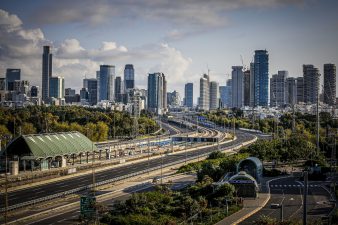Why does Israel so lag Arab neighbors like Morocco and Egypt in its renewable energy production?
I do not understand how the nation that invented CSP solar thermal – the solar energy that now powers much of the worlds gigantic utility-scale solar plants – can be just now announcing some tiny 35 MW solar project as its “largest ever!” – and Spain’s Solaer group that is supposedly to build it; doesn’t even have a website – when Morocco is building its first 500 MW plant with international energy giant Siemens.
Can anyone tell me what’s going on? I have never lived in the Middle East region, unlike the rest of the local bloggers here at GreenProphet – perhaps I’m missing something that is rather obvious to the rest of you.
In the US, only our fossil states are as backward in renewable energy development.
The more gas and oil and coal a state has, the more feeble its renewable requirements, in something familiar to petrostates as “the Resource Curse”.
In 2010, I suggested that the Leviathan Gas Discovery Could be The Mother of All Resource Curses. At the time, I didn’t really think this could be literally true, but now I wonder.
Like those US states, Israel lags in renewable deployment. It’s first and currently only large-scale solar plant is a 5 MW facility on a kibbutz in the Negev. That is pretty backward. It’s renewable requirements are for only 10% compared with Egypt and Morocco’s 20%. Did Israel’s massive discovery of gas a few years ago turn it instantly into a petrostate?
It is not as if Israel lacks the brains to develop cutting edge solar technologies. The list is long. Israel’s companies dominate any global awards list with with cutting edge technology innovation.
7 Solar Innovators From Israel That Could Fuel Our Planet
Pythagoras Solves Solar Energy Equation at Sears Tower
But when it comes to plain old powering up, using solar, Israel might as well be living in the dark ages.
The solar thermal that Israeli engineer Luz invented now powers most of the utility-scale solar projects in operation worldwide. His technology has propelled Spanish giant Abengoa to world leadership with 16 concentrating solar power plants and more than 1,100 MW in operation and under construction around the world.
Luz’s own offshoot BrightSource has literally gigawatts of power under way in the US, but not 1 BrightSource watt powers Israel itself. Why?
In a very slow move to supply 10% of its capacity by 2020, Israel’s Ministry of Energy and Water Resources issued its first solar PV licenses for 19 tiny projects which will have a combined total capacity of only 27 MW of photovoltaic (PV) solar power. By comparison, remember, Morocco is building a 500 MW project this year.
You tell me. What’s going on?
Related stories:
BrightSource Energy Has Potential to Supply 13% of California’s Electricity
Leviathan Gas Discovery Could be The Mother of All Resource Curses





(some additions to my previous comments)
Frank, you are absolutely correct that green tech is the future of growth. I want to add a few words on the state of things in Israel
Solar companies – Luz has been recently acquired by Siemens, but the trough technology is now seen as out dated and on the way out.
Brightsource is having a great run, but only in countries with government subsidies. I wonder how much of the technology is developed in Israel, and how much will be developed in hands-on experiences in other countries.
HOt-water solar use is universal in Israel.
Water – Israel has been running a huge water deficit for 50 years (as have all middle-eastern countries..). However, Israel now has huge desalination capacity coming on line in 2012-2014. This will push us into a national water surplus by 2015, allowing a gradual replenishment on the Kinneret lake and the mountain aquifer.
However, this has come about only since RO technology significantly reduces the desalination cost.
Israel is also a world leader (percentage wise) in water reuse, particularly in agriculture. I believe urban water waste management is also on-par with other advanced economies.
Electricity is controlled by a strongly unionized single producer, which has an awful record in finances and governance. Nothing i can write can even begin to describe these monopolistic abuses.
In a classic Israeli fudge, the grid itself is world leading quality, the prices are regulated and low, and the gap is bridged by a huge amount of expensive debt accumulated by the electricity company.
Due to cheap gas discoveries, even this lumbering giant has been forced to switch from coal to to gas. This is great for GHG reductions, but basically kills any hope for a real 30% or 50% renewable target.
Solar PV will only grow slowly, since low FIT rates are already being reduced. I for see a huge uptake once we reach grid parity, despite most israelis living in apartments not houses.
There is strong political support for the “Better Place” electric car experiment. However, the Israeli market is too small to affect world trends, so uptake will be strongly correlated to world trends.
After writing this, i realize this politically-grid-locked country IS getting greener 😉 So i am actually smiling.
YA reminds me of the Israeli guide who commented that the Israeli economy runs on: diamonds,[silicon] chips and tourists by importing modest or low VA goods givng them a cut and polish and re-exporting them with high VA. Certainly all three sectors – and solar water heaters and desalination have brought in priming wealth which allows the rest of the economy to turn over and gas will also do so especially if it is not just used and sold, but sparks a chemical industry(ies?) expansion. The gas wealth can also be used to capitalise green changes: solar panels on roofs and walls, building local grey water recycling to WC’s, electric cars and Zaslavsky towers in the southern Arava and southern shefela for base load power and non-agricultural water.
However in the background of the priorities arguments is the observed fact that these two centuries, the economy has advanced by refurbishing the entire economy with the spread and development of the latest inventions. Turnpikes, canals and docks in the 18th century, steam technology in the 19th and internal combustion and electricity in the 20th with electronics as radio radar and television then computerisation and mobile phones being the latest great cycle of “Progress” and “Improvements.” The green revolution is about to become the great mainspring of the next socio-economic expansion and changes because all the great financial centres (and the bulk of urban Israel) are big coastal cities left over from maritime Europe’s colonial period and a lot of money is sitting in the buildings’ wealth and about to drown if we do not carry off the green revolution.
Here is my viewpoint, I am a pro-green Israeli engineer..
a. The political landscape is dominated by the national security debate. In recent years, there is more and more focus on growth and economic issues. Environmental and sustainability are still a long long way behind, particularly since they are inevitably seen as an expense not a net-income project.
b. In the last 2 decades, Israel industry and academy has seen a massive massive shift to high-tech ventures, startups, software, telecom and hardware. This sector has lower capital requirements and has returned higher-yields to investors. Contrast this with still-emerging and capital-intensive green/clean-tech trend.
c. Israel is small country, crowded, with more demographic pressures in the future. Land use is highly regulated, and politically contested, along both jewish/arab lines, but also urban/farming conflicts, and land-as-revenue-source-for-the-government vs. land-as-a-public-resource line.
d. While Israel is extremely advanced technologically, it is also highly unequal, in wealth, income, education. There are still huge social challenges which makes green subsidies a not high enough priority.
Hope this helps
I am happy to point out though, that there is tremendous progress on many of these issues in Israel in recent years. Here is to hoping.
Part of the problem is how the accountants are briefed to repay the capital investment een if fundamentally capital which devalues is cheaper than labour whose wages follow inflation. “Between the wars” both the US and Soviet Union thought they would make a massive leap with fuel saving hydro-power but found problems in the repayment of the interest etc on the massive up front capital sums required. Thermal stations are relatively smaller in capital front charging. What is always known is that modular developments eg domestic water solar heaters at the micro level are financially more bearable to an economy and so politically to its government. Another Israeli problem is the lack of space for large solar arrays. Israel is so often in the news and mapped in isolation people forget it is small. The Palestine Mandate was 10 400 square miles so a 100 sq miles is 1%, 1949 Israel is not quite 8000 sq mls or at roughly 2.5 sq kms to the sq ml 23k sq kms.
Dr. Gotlieb! Here, here!!!
Dear Susan,
The indicators you point to reflect the thinking of the current Israeli administration and its pro-capital program, a project which has dominated the country not only in environmental and energy matters but in virtually all aspects of life here. It is the same ideology that has created yawning gaps between social sectors and serves special interests groups rather than the public at large.
One hopes that Israelis from all walks of life will serve notice that the ideology implicit to the government’s policies is unacceptable and that the long-term public interest supersedes the hunger for profit that characterizes the privileged sector of tycoons. Perhaps then, vitally important issues life renewable energy will receive the attention they deserve.